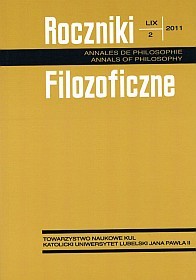Zastrzeżenia wobec kreacjonistycznej interpretacji Wielkiego Wybuchu
Abstrakt
The article shows why the Big Bang should not be identified with the moment when God created the Universe. The methodological objections arise from the accepted conception of autonomy of different disciplines (science, philosophy and theology), and from the principle of methodological and epistemological uniformity which is derived from that conception. On the subject plane these objections arise from the analysis of cosmological and theological knowledge. Cosmology does not give any ground for asserting that the Big Bang is an absolute temporal beginning of the Universe. Theology provides no argument for the creation in some specific time. On the contrary, its representatives warn against identifying the act of creation with the Big Bang.
Bibliografia
Anderwald A.: Teologia a nauki przyrodnicze. Rola wiedzy przyrodniczej w dociekaniach teologicznych, Opole 2007.
Barbour I.G.: When Science Meets Religion: Enemies, Strangers, or Partners?, San Francisco 2000.
Bronk A.: Zrozumieć świat współczesny, Lublin 1998.
Davies P.: God and the New Physics, New York 1983 (pol. Bóg i nowa fizyka, tł. P. Amsterdamski, Warszawa 1993).
Davies P.: The Mind of God. The Scientific Basis for a Rational World, New York 1992 (pol. Plan Stwórcy. Naukowe podstawy racjonalnej wizji świata, tł. M. Krośniak, Kraków 1996).
Hajduk Z.: Filozofia przyody. Filozofia przyrodoznawstwa. Metakosmologia, Lublin 2004.
Hawking S.: Krótka historia czasu. Od Wielkiego Wybuchu do czarnych dziur, Warszawa 1993.
Heller M.: Czy fizyka jest nauką humanistyczną?, Tarnów 1998.
Heller M.: Kosmologia kwantowa, Warszawa 2001.
Heller M.: Filozofia i Wszechświat. Wybór pism, Kraków 2006.
Heller M.: Ostateczne wyjaśnienia Wszechświata, Kraków 2008.
Heller M.: Stworzenie świata według współczesnej kosmologii, [w:] M. Heller, M. Drożdż (red.), Początek świata – Biblia a nauka, Tarnów 1998, s. 185-198.
Isham C.J.: Quantum Theories of the Creation of the Universe, [w:] R.J. Russell, N. Murphy, C.J. Isham (red.), Quantum Cosmology and the Laws of Nature, Vatican Observatory Publications 1996.
Jeans J.H.: The Universe Around Us, Cambridge 1929.
Jeans J.H.: The Mysterious Universe, New York 1932.
Kamiński S.: Typy ludzkiej wiedzy, [w:] tenże, Jak filozofować? Studia z metodologii filozofii klasycznej, do druku przygotował T. Szubka, Lublin 1989, s. 13-32.
Mazierski S.: Fizykalne a filozoficzne wyjaśnianie rzeczywistości, „Roczniki Filozoficzne” 7 (1959), z. 3, s. 39-67.
McMullin E.: How Should Cosmology Relate to Theology?, [w:] A.R. Peacock (red.), The Science and Theology in the Twentieth Century, Notre Dame, Ind. 1981.
Meissner K.A., Wrochna G.: Początek Wszechświata – najwspaniajszy eksperyment fizyczny, [w:] A. Lemańska, A. Świerzyński (red), Filozoficzne i naukowo-przyrodnicze elementy obrazu świata. Współczesne kontrowersje wokół początków Wszechświata i początków życia, t. 8, Warszawa 2010, s. 11-24.
Milne E.A.: Relativity, Gravitation and World-Structure, Oxford 1935.
Milne E.A.: Modern Cosmology and the Christian Idea of God, Oxford 1952.
Peacocke A.R., Science and the Christian Experiment, London 1971 (pol. Teologia a nauki przyrodnicze, tł. L.M. Sokołowski, Kraków 1991).
Pius XII: Istnienie Boga w świetle nowoczesnej przyrodniczej wiedzy, „Przegląd Powszechny” 233(1952), nr 1, s. 3-16.
Rahner K.: Podstawowy wykład wiary. Wprowadzenie do pojęcia chrześcijaństwa, Warszawa 1987.
Such J.: Problem wieczności świata w świetle teorii Wielkiego Wybuchu, [w:] tenże, M. Szcześniak, A. Szczuciński (red.), Filozofia kosmologii, Poznań 2000, s. 171-173.
Such J.: The origin of the Universe and contemporary cosmology and philosophy, [w:] E. Piotrowska, J. Wiśniewski (red.), Philosophical aspects of the science, Poznań 2005.
Turek J.: Wszechświat czasowo nieskończony i stworzony, „Studia Warmińskie” 28 (1991), s. 217-233.
Turek J.: Kosmologiczny kontekst formułowanych współcześnie argumentów teistycznych, „Roczniki Filozoficzne” 56 (2008), nr 1, s. 295-313.
Turek J.: Filozoficzne interpretacje faktów naukowych, Lublin 2009.
Turek J.: Problem wyboru najlepszego wyjaśniania filozoficznego faktów naukowych, „Studia Philosophiae Christianae” 43 (2009), z. 1, s. 179-199.
Whittaker E.T.: Space and Spirit: Theories of the Universe and the Arguments for the Existence of God, London 1946 (pol. Przestrzeń i duch – teorie Wszechświata i argumenty za istnieniem Boga, tłum. W. Staszewski, Lublin 1963).
Whittaker E.T.: The Beginning and End of the World, London 1952.
Życiński J.: Bóg i ewolucja. Podstawowe pytania ewolucjonizmu chrześcijańskiego, Lublin 2002.
Copyright (c) 2011 Roczniki Filozoficzne

Utwór dostępny jest na licencji Creative Commons Uznanie autorstwa – Użycie niekomercyjne – Bez utworów zależnych 4.0 Międzynarodowe.





